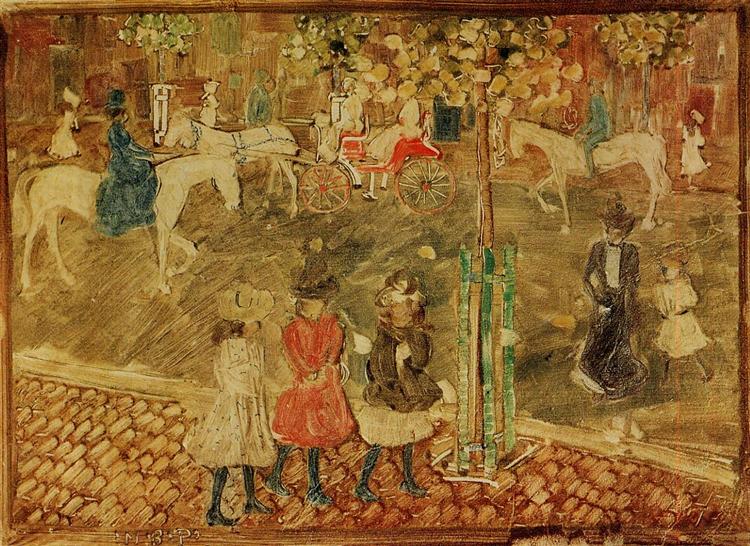Description
The "horseback rider" painting of Maurice Prendergast, created in 1900, is a work that encapsulates the essence of post -impressionist art in which the author stands out for his ingenious fusion of color, formality and the representation of everyday life in an environment natural and festive. Prendergast, known for its use of vibrant color and its attention to detail, achieves in this work a dynamic and sparkling representation of riders that seem to be part of a community scenario, while standing out with their moving horses.
The composition is skillfully organized: the viewer's gaze is guided by the hierarchical disposition of riders who occupy the center of the scene, surrounded by a landscape full of vegetation and color. Each figure, although it is small in relation to the vast background, radiates a palpable energy that reinforces the idea that these riders are the focus of a celebration in the midst of nature. The figures are mostly in motion, which suggests a sense of joy and freedom. This animation, coupled with the characteristic use that Arrentgast makes of simplified forms, contributes to a feeling of harmony and feast that crosses the entire work.
The color in "horse riders" is one of the most outstanding aspects. Arndast uses a bright and contrasting palette, where warm and cold tones are balanced so that each element of the paint seems to vibrate alive. The fusion of lush green, fresh blue and touches of primary colors creates an environment that is not only visually attractive, but also evokes a feeling of joy and invitation to immerse itself at the captured time. This approach to color not only defines the central figures, but also gives life to the landscape that frames the scene, suggesting an almost festive atmosphere.
Purkey, influenced by its contemporaries and its trips to Europe, incorporates elements that reflect the modernity of its time, as well as the influence of impressionism and neo -impressionism. His works, including "horse riders", reflect an interest in everyday life and leisure, celebrating outdoor spaces and moments of community. This painting can also be seen as part of a broader trend in the art of the late nineteenth and early twentieth centuries, in which artists began to capture the vibrant social life in natural environments as a central theme.
Although riders could be considered as archetypes of joy and the free spirit, in this particular work there is no specific narrative about the characters; They are rather a symbol of the moment and life itself. Instead of thorough details of individual characters, they are their positions and the energy that transmit what becomes crucial. This is characteristic of the Pledge approach, which prioritizes the atmosphere and general impression rather than the detailed portrait.
In summary, "horse riders" is not only an exhibition of the mourice maste of community and pleasure in the simple. The work evokes a lost moment in time, capturing the essence of the connection between man and nature, while also invites a reflection on movement and joy in everyday life. In the context of its production, Arrentgast stands as a precursor of modernity, making this painting a lasting legacy in the history of American art.
KUADROS ©, a famous paint on your wall.
Hand-made oil painting reproductions, with the quality of professional artists and the distinctive seal of KUADROS ©.
Art reproduction service with satisfaction guarantee. If you are not completely satisfied with the replica of your painting, we refund your money 100%.

